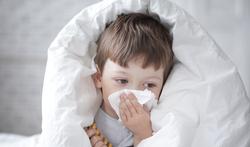Seasonal flu is the annually recurring winter flu that is caused by common, known and annually recurring flu viruses. Because seasonal flu is caused almost every year by a different flu virus, the flu vaccine is adjusted every year. Hence, the only way to be protected against seasonal flu is an annual vaccination.
What is flu?
Flu or Influenza is an acute infection of the upper respiratory tract (nose, throat, lungs) and is caused by the influenza virus that pops up every year during the winter period. Hence the name Influenza. There are three types of this virus, A, B and C. The A type is responsible for the most serious infections.
The flu virus is particularly contagious. It is often sufficient to come into contact with an infected person so that the viruses can penetrate the nasal mucosa, windpipe and bronchi and spread there. A flu epidemic can affect 5 to 10% of the population in a few weeks.
What is the difference between flu and a cold?
Many people confuse a common cold with flu. In both cases it is an infection of the upper respiratory tract by viruses.
You are usually more seriously ill with flu than with a cold. Fever and muscle pain usually do not occur with a cold. The symptoms of a cold generally also disappear faster and complications such as pneumonia are rare.
The most important flu symptoms are:
- fast emerging fever (> 38 ° C)
- muscle pain, headache
- shivery
- tired and exhausted
- sore throat
- cough
How does the flu virus spread?
The flu virus is mainly transmitted through the air with saliva droplets released by coughing or sneezing. These droplets, which move in the air, can directly infect someone through breathing. This mainly happens in spaces where people are close to each other and where there is poor ventilation, for example in a train or bus, a school or daycare. Viruses also end up on all kinds of objects via the air. A person can become infected if he touches an object (eg a doorknob, toy) that contains viruses and then touches his eyes, nose or mouth. The saliva can also be transmitted through the hands (shielding the mouth during coughing) through objects touched by it.
The flu virus is highly contagious. Talking to someone who has the flu can be enough to get infected. Whoever sits on a bus or train next to someone who has the flu can just get infected. Those who spend a lot of time in crowded places or in confined spaces have a good chance of being infected.
During a flu epidemic, around 10 to 20% of people get the flu. Up to 45% can fall ill with school-aged children and children staying in a daycare center. If the flu virus circulates through your child or yourself in the family, at least 30% of the other family members will eventually also get flu.
How come people get flu especially in winter?
Influenza occurs in areas with a temperate climate only in the winter season (November - March). In the southern hemisphere, the flu season falls when it is winter there (March-November). In tropical areas, on the other hand, it occurs all year round.
Why we only have influenza in winter is probably because we spend more indoors during cold periods and the virus can survive longer in the cold, moist outside air.
How serious is flu?

For most people, flu is a benign disease. Healthy people normally heal automatically after five to seven days. The fever diminishes after two days and disappears after five days. It can take a few weeks before you are completely old. The cough can also last for a few weeks.
However, serious complications can occur in certain risk individuals, such as pneumonia, which can even be fatal. Every year several thousand people die in our country as a result of such complications.
To whom can the flu be dangerous?
The flu can aggravate existing diseases, such as diabetes. It can also cause serious complications in some people, such as pneumonia.
The following people are considered to be at risk:
- people with a chronic heart disease; these are often people who have had a heart attack, who have heart problems such as cardiac arrhythmias, or people who have had heart surgery;
- people with a chronic lung disease such as asthma, COPD, cystic fibrosis
- people with diabetes (diabetes); not only people who inject insulin, but also people who take tablets with blood sugar lowering drugs or follow a diet;
- kidney and liver patients;
- people with a weakened immune system due to illness (eg cancer, HIV ...) or medical treatment, for example people who have recently undergone a bone marrow transplant, people with cancer who are undergoing chemotherapy or radiation therapy, people with chronic inflammatory diseases (such as chronic arthritis) , Crohn's disease and psoriasis) that take immunosuppressive drugs;
- People with a severe neurological disorder (eg: cerebral palsy);
- people aged 65 and over. Elderly people who live in a retirement or care home are extremely susceptible to infection in an epidemic;
- pregnant women.
Vaccination against pneumococci
A significant part of the disease and death from a flu epidemic is the result of bacterial surinfection, often caused by pneumococci.
You can get vaccinated against pneumococci. This vaccine must be administered every 5 to 7 years.
The following people are advised to get vaccinated against pneumococci:
- patients with functional asplenia (malfunctioning spleen) or after splenectomy (removal of the spleen).
- all persons older than 65 years
- patients older than 50 with:
- chronic heart and lung diseases
- chronic liver disease with or without cirrhosis
- HIV-infected patients
- Vaccination can be considered for all patients with:
- organ transplant
- lymphoma, chronic lymphocytic leukemia, multiple myeloma
- cerebrospinal fluid leak
- other chronic conditions such as chronic kidney disease or cardiovascular disease.
Can flu be prevented?
The only proven effective method of prevention is vaccination. Antiviral drugs, such as Amantadine, Relenza (zanamivir) and Tamiflu (oseltamivir), can also prevent flu, but are used earlier in people who are already sick. They inhibit the infection and mitigate the symptoms.
You can also take the following measures:
- Hold your hand or handkerchief in front of your mouth when you sneeze or cough. Then wash your hands with soap and water (or rub them in with hand alcohol).
- Wash your hands regularly with soap and water: rub well while counting to 30. Then rinse well and dry. Cleaning wipes with alcohol are also effective;
- Touch your mouth, nose or eyes as little as possible;
- Always use paper handkerchiefs or tissues for coughing, sneezing or snouts and use them once. Then throw them in the garbage bin (preferably sealed) and then wash hands;
- Clean regularly. Clean hard surfaces and objects (such as the sink, kitchen utensils, taps, door handles, handrails and telephones) regularly. Do this with a normal detergent.
- Avoid as many (closed) places as possible where many people come together (such as train, tram, cinema ...). Regularly ventilate the room where several people are together.
- Avoid contact with sick people as much as possible.
- Ensure good physical condition and avoid physical stress (due to insufficient sleep, strong cooling, for example). Prefer not to smoke.
- Echinacea or other plant-based supplements, or high doses of vitamin C flu (or colds) have never been adequately demonstrated.
Do I have to wear a nose-to-mouth mask to protect myself against the flu virus?
There is no indication whatsoever to wear a mask if you are not sick. To protect you against the flu, the best measures are to follow the basic hygiene regulations.
Only practitioners of health professions and persons who come into contact with the sick frequently and closely, wear masks of the FFP2 type. The FFP2 mask filters the particles that come in from the outside.
If you are sick, you can wear a mask if there are others in your area to prevent transmission of the disease.
Can I take measures to protect my child?

The same protection measures apply to your child as to yourself. Minimize the risk of contamination by using tissue paper when coughing and sneezing and by washing your hands thoroughly.
Flu can be very serious in young babies. Breastfeeding ensures that infants fall ill (often) due to, among other things, influenza. Breast milk contains antibodies from the mother that help fight infection. Breast milk also contains a metabolite, an active ingredient that is also contained in the antiviral drug Tamiflu. These antibodies are passed on to the baby via breastfeeding. So breastfeed as regularly as possible.
Who needs to be vaccinated against seasonal flu?
In Belgium, the High Health Council advises to vaccinate the following people as a priority against seasonal flu: Group 1: persons at risk for complications, i.e.:
- all persons older than 65 years
- all persons admitted to an institution
- all patients from the age of 6 months who suffer from a chronic disorder, whether or not stabilized, of the lungs, heart, liver, kidneys, metabolic disorders (such as diabetes), or immune disorders (natural or as a result of medical treatment)
- children between 6 months and 18 years who undergo long-term aspirin therapy.
Group 2: all persons working in the health sector and in direct contact with persons in group 1.
Group 3: Pregnant women who are in the second or third trimester of their pregnancy at the time of vaccination.
Group 4: all persons between 50 and 64 years of age, even if they do not suffer from a risk disorder, because there is one chance in three that they present at least one complication risk, especially those who smoke, drink excessively and are obese. For all these risk groups, the flu vaccine is partially reimbursed by health insurance.
Keep the flu vaccine cool
If you want to be vaccinated against the flu, you must ask your doctor for a prescription with which you can collect the vaccine at the pharmacy.
The vaccine must be kept cool. That means between 2 ° C and 8 ° C in a properly functioning refrigerator. It is recommended to keep the vaccines in the central part of the refrigerator, sufficiently removed from the rear cooling element. Too many and too large temperature fluctuations occur in the door.
To avoid breaking the cold chain, it is advisable to put the vaccine in the refrigerator immediately after purchase (and not leave it for a few hours while you are shopping, for example). It is even better to collect the vaccine from the pharmacist just before you go to the doctor to have it injected. You can also reserve the vaccine at your pharmacist who will keep it at the right temperature until you need it.
What are the benefits of influenza vaccination?
The flu shot protects you against serious consequences of the most common flu viruses. If you have had the annual flu shot, the chance that you will get the flu is much smaller. If you do get the flu, the disease is usually less severe. In addition, the flu shot reduces the risk of complications such as pneumonia and worsening of existing diseases, such as diabetes disruption.
I am never sick, do I still need to be vaccinated?
 Yes, if you belong to one of the risk groups because the consequences of flu are very serious. That is why it is advisable to get the flu shot every year, even if you are never sick. Every winter an average of one in ten people get flu. So nine out of ten people don't get the flu in a winter. You may have been lucky so far, but you may come into contact with the flu virus this year.
Yes, if you belong to one of the risk groups because the consequences of flu are very serious. That is why it is advisable to get the flu shot every year, even if you are never sick. Every winter an average of one in ten people get flu. So nine out of ten people don't get the flu in a winter. You may have been lucky so far, but you may come into contact with the flu virus this year.
I am not one of the target groups, can I still get myself vaccinated?
Yes, this is possible for the seasonal flu vaccine. You are then much less likely to fall ill and, for example, have to take time off work, and you also have less chance of complications.
You do have to pay the costs yourself, unless your employer pays for the vaccine.
It cannot be used for vaccination against swine flu. That vaccine is reserved for risk groups.
Can pregnant women be vaccinated?
Pregnant women in the second or third trimester are a risk group and are eligible for vaccination.
Pregnant women are advised against being vaccinated in the first trimester of their pregnancy. This applies both to the vaccination against A / H1N1 flu and against seasonal flu.
Why do you have to get vaccinated again every year?
The flu virus regularly undergoes mutations, changes. The antibodies that are produced one year against the flu virus do not systematically recognize the virus the following year. So we are in fact poorly armed against the flu, and can get infected several times, each time with the slightly modified virus.
To be protected against possible complications, risk persons must therefore be vaccinated annually with the new vaccine based on the characteristics of the virus from the previous year.
This can also explain why people who have had themselves vaccinated can still get the flu. This is because they can be infected by a new flu virus against which the vaccine does not yet offer protection, or against a relatively rare virus that is no longer included in the vaccine. But usually the vaccine still offers some protection and the disease is less severe and there are also fewer complications compared to people who have not been vaccinated.
When is it best to get vaccinated?
The vaccination is done before the risk period, so best between the beginning of October and the middle of November. It takes about fourteen days for you to build up sufficient antibodies to be protected against the flu virus. In full epidemic a vaccination is therefore too late.
Can you still get the flu if you are vaccinated?
The flu vaccine has an overall efficiency of 70%; the effectiveness varies according to age: the effect decreases in older people.
So vaccinated people can still get the flu, but usually it is a less severe form. The effectiveness is mainly reflected in the reduction of complications: thanks to the vaccine, the number of hospitalizations is reduced by 70% and the death rate by 80%.
The regular flu vaccine does NOT protect against Mexican flu. There is a separate vaccine for this.
Of course, the flu vaccine only offers protection against the flu viruses and not against other winter ailments caused by totally different viruses. For example, despite the flu shot you may still have a cold, a sore throat or a "stomach flu". This does not mean that the flu vaccine has failed, but simply that you are unlucky and have fallen victim to another virus.
What are the side effects of the flu vaccine?
Side effects are rare and usually not serious. It is possible that the place where the injection was given (the upper arm) is a bit swollen and reddered for a few days. It can be itchy or a bit painful. You don't have to worry about this, it will disappear spontaneously after a few days.
Sometimes some fatigue, a slight increase in temperature, headache, joint pain or muscle pain may occur. You can sweat a little or be shivery, like with a starting flu. This too usually disappears by itself.
If other symptoms occur in the days following vaccination (such as skin rash, pain, nausea, etc.) then you should consult your doctor.
Persons who are allergic to eggs (anaphylactic shock, breathing difficulties ...) or who have previously reacted poorly to certain vaccines must inform their doctor. You may then not receive a vaccine.
The fear that people could get the flu from the flu vaccine is totally unfounded. The vaccine contains only killed virus particles and therefore cannot cause flu.
What can you do if you have the flu?
 In most cases flu will heal naturally. You can only try to reduce the complaints as much as possible.
In most cases flu will heal naturally. You can only try to reduce the complaints as much as possible.
- Rest: Stay home and rest, especially if you have a fever. Certainly do not exercise with a fever.
- You have to drink a lot in the event of a fever, because a lot of fluid is lost due to the fever and the associated sweating.
- You may take a painkiller or antipyretic medicine, such as acetaminophen or aspirin. Do not give aspirin to children, but do give acetaminophen.
- A blocked nose can be treated with a physiological saline solution or with nasal sprays and drops that swell the nasal mucosa. Do not take them for more than a few days to prevent habituation and do not use them with small children.
- Do not smoke and avoid passive smoking.
Because flu is caused by a virus, antibiotics are useless. Unless an additional infection occurs on the airways or lungs caused by bacteria. In that case, your doctor will probably prescribe antibiotics.
Are there any medicines for the flu?
There are no medicines for flu. Only the symptoms can be combated.
Antiviral drugs ensure that the patient coughs out less virus that could infect other people. In addition, the drug shortens the duration of illness and reduces the risk of complications.
There are two products: oseltamivir (product name: Tamiflu®) and zanamivir (product name: Relenza®).
These medicines must be taken as quickly as possible and certainly within 48 hours after the first symptoms.
These resources are only recommended for people at risk.
For which persons are virus inhibitors recommended?
The doctor can prescribe virus inhibitors for persons at risk (these are people in whom a flu can cause serious complications). They receive the antiviral drugs for free.
These include the following groups:
- patients with a chronic respiratory disease;
- patients with chronic heart disease
- patients with moderate to severe renal or hepatic impairment
- Patients with chronic neuromuscular disorders;
- Patients with a severe neurological disorder (eg: cerebral palsy)
- patients with immunodepression due to illness or treatment
- diabetes patients
- Patients who are carriers of a hereditary metabolic disorder;
- Pregnant women in the second and third trimesters;
- persons older than 65 years
- patients who have been hospitalized with a serious clinical picture, subject to the 48-hour period
Are virus inhibitors freely available?
No, virus inhibitors are only available with a doctor's prescription. It appears that possibilities are offered via the internet to order virus inhibitors. This is not recommended. The composition of the internet product is unknown and probably not tested. In addition, it is important for the treatment that the prescribing doctor knows the patient and his medical history.
Can I take virus inhibitors or antipyretics if I am pregnant?
What is the effect on my unborn child?
Always consult your doctor first before you start taking medication. He will carefully weigh the pros and cons of medication.
Only medication based on Paracetamol is suitable for fever if you are pregnant.
The antiviral medicines Tamiflu and Relenza may be prescribed to risk groups such as pregnant women, even after 48 hours. Relenza was found to be the most suitable antiviral for pregnant women because it is being inhaled. That way it does not end up in the blood and does not reach the fetus. Little information exists about the effect of these antiviral drugs on pregnant women and babies (or unborn children), but no serious side effects have been identified.
Can a virus inhibitor be used in children under 1 year of age?
Oseltamivir (product name: Tamiflu) is not registered for the treatment and prevention of common flu in children under one year of age. In the event of a pandemic, Tamiflu can be used in children under the age of one if the doctor considers it necessary.
Relenza may only be used from the age of 5 years.
Why antibiotics don't help against the flu?
 Flu (and most other upper respiratory tract infections, such as a cold) is caused by viruses. Antibiotics only work against bacteria and have no sense whatsoever against a disease caused by a virus. These will heal normally after a few days. Many people mistakenly attribute their healing to the use of antibiotics, while it is a natural healing process. Antibiotics do not reduce the symptoms (fever, pain ...) and do not speed up the healing process.
Flu (and most other upper respiratory tract infections, such as a cold) is caused by viruses. Antibiotics only work against bacteria and have no sense whatsoever against a disease caused by a virus. These will heal normally after a few days. Many people mistakenly attribute their healing to the use of antibiotics, while it is a natural healing process. Antibiotics do not reduce the symptoms (fever, pain ...) and do not speed up the healing process.
In some cases, your doctor will still prescribe antibiotics if he suspects that there may be a bacterial infection (eg pneumonia) or an additional bacterial infection. You must then take the prescribed dose completely, without interrupting treatment, even if you have healed in the meantime.
When should I consult my doctor?
Sometimes flu does not pass automatically. Other diseases may need to be treated, such as pneumonia. In the following cases it is good to contact the doctor:
- when the symptoms last longer than five days or get worse;
- with frequent coughing;
- if you get other symptoms in addition to fever and muscle pain (eg shortness of breath).
In the case of a child, it is advisable to contact the doctor if he has a high fever (+ 39 °) that does not sag after a day or three or four, if the child refuses to drink or starts vomiting. Even when the child complains about ear pain, it is best to consult your doctor because this indicates that something more serious is going on.
People from a high-risk group can always contact their doctor if they think they have the flu.
When are you contagious to others?
It may take one to seven days after you get the flu virus, but you usually get the first symptoms after two to three days. This is called the incubation period. During the incubation period you can infect other people without your knowledge.
Adults are contagious - and can spread the virus - the day before the symptoms appear. Young children can carry the virus up to six days before the symptoms manifest themselves. All the while they can ignite other people. Adults are contagious for up to five days after the first symptoms and children can be contagious for another five days.
Not everyone gets sick after being infected, some people are infected with the virus and are contagious without ever having been sick.
What can you do to prevent you from infecting other people?
If you have the flu, avoid infecting others.
- Stay inside as much as possible and avoid contact with other people as much as possible. Certainly do not visit vulnerable elderly or young children.
- Cover mouth and nose when you sneeze or cough.
- Preferably use paper handkerchiefs and throw them into the garbage bin after use.
- Wash hands regularly.
- It is also recommended to wear a surgical mask. That mask will reduce the spread of saliva droplets by coughing or talking. After all, those droplets are the carriers of the virus.
- Cover your nose and mouth with the mask as carefully as possible.
- As soon as you wear a mask, touch it as little as possible with your hands. Do you still touch it? Then wash your hands.
- A mask can become moist after long use. Then replace it.
Children in particular are transmitters of flu. That is why it is better not to visit grandparents or great-grandparents at home or in the retirement home with feverish, coughing and sneezing children. Nor is it advisable to drop off sick children who are not allowed to go to daycare to grandparents if they themselves already have a higher risk.




